
Testing and certification organisation Bureau Veritas has warned of an increasing risk of AC-type residual current devices being adversely affected by direct currents, potentially putting people at risk.
The RCDs, used to trip electric circuits to prevent electric shock, can be affected by electronic equipment and renewable energy sources such as solar PV leaking direct current back into the electrical system. It argues that the industry should instead adopt Type A or Type B RCDs.
AC Type RCDs have been widely used especially since 2001, where the 17th edition (Amendment 1) of the IEE Wiring Regulations stated AC Type RCDs should be used for sockets that might supply outdoor equipment.
Bureau Veritas argues that as more and more homes, commercial and industrial sites are using electronic equipment and installing renewables such as solar PV, many of these RCDs may be no longer be suitable.

Michael Kenyon
Bureau Veritas technical manager Michael Kenyon said: “Modern electrical installations are more than ever incorporating technology and products that manipulate the current wave forms. Devices could be leaking direct current back into the electrical system and saturating the iron core of the AC type RCDs, which are not designed to handle it.”
He added that this is a particular problem with poor quality electronic equipment or substandard installations. DC leakage current could be created by faulty equipment such as solar PV, EV chargers, variable speed drives, and even faulty mobile phone chargers or USB sockets.
Bureau Veritas says that industry should insteadconsider using A or B type RCDs which are specifically designed to offer protection against alternating and pulsating direct, as stated in the recent rewrite of 531.3 of BS7671. But Mr Kenyon added that though the rewrite had led to an increased awareness of the different types of RCD on the market, “at the moment it just doesn’t go far enough in recommending the use of A type RCDs”.
In addition. “From our experience, we’d recommend A type RCDs for general use,” he said. But because Type A RCDs are much less readily available and are significantly more expensive, this would need to be supported by regulation, the industry and even manufacturers, he said.
“Specifying the correct RCDs can be a technical and complicated area, and currently there’s a knowledge gap in the electrical industry,” Mr Kenyon said. He recommended regular testing and inspection to make sure every electrical installation remained safe and fit for use.
Further information: 0345 600 1828
www.bureauveritas.co.uk

